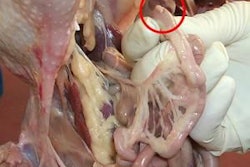
Dr. Don Layman was appointed as the Director of Research for the Egg Nutrition Center (ENC), an affiliate unit of the American Egg Board (AEB) in 2009. Dr. Layman assumed this position after retiring as a professor of nutrition at the University of Illinois at Urbana-Champaign. He earned his B.S. and M.S. degrees in biochemistry from Illinois State University and a Ph.D. in human nutrition in 1978 from the University of Minnesota. During his distinguished career Dr. Layman has earned numerous awards from prestigious professional associations, served on editorial boards of peer review journals and functioned in both departmental and college administrative positions, responsible for multi-million dollar budgets.
Egg Industry: How is the Egg Nutrition Center structured?
Don Layman: The Executive Director of ENC is Dr. Mitch Kanter who has overall responsibility for the administration and management of the Egg Nutrition Center. My position is Director of Research, responsible for evaluation and administration of extramural grants. Other members of the ENC staff include Marcia Greenbaum, Senior Director of Nutrition Education who is responsible for educational programs and outreach, and Michelle Leistiko, Program Manager for Nutrition Education and Communications who is responsible for overseeing the ENC website and monitoring research related to the egg industry. The past year has been a year of change including reorganization and strategic planning with the hiring of Dr. Kanter, Ms. Leistiko, and myself plus movement of ENC from Washington D.C. to Chicago to be closer to the AEB headquarters. Our goal is to make ENC even more efficient and effective for the egg industry.
EI: Could you define some of the objectives of the ENC?
DL: The ENC mission is to be a credible source of nutrition and health science information and the acknowledged leader in research and education related to eggs. We have undertaken a strategic planning process to ensure that our resources, both financial and human are used to the maximum effect to understand the role of eggs in a healthy diet.
EI: What specific projects are under consideration?
DL: Our strategic planning has led us to recognize three major research pillars, as we refer to them. The first is documenting the value of protein especially at breakfast. We believe that eggs eaten at the morning meal have a beneficial effect on body composition and satiety and ultimately long-term body weight. Our second pillar is a renewed interest in lipid and cholesterol metabolism with a focus on the relationship of dietary cholesterol to risk of cardiovascular disease. Reducing dietary cholesterol continues to be a cornerstone of U.S. dietary guidelines but the published science in support of this relationship is weak and most countries around the world have dropped cholesterol from dietary guidelines. Within this area, we will be considering the individual impact of cholesterol versus saturated fats on metabolism and health. The third area of interest relates to nutrient density. The egg is unique as a complete food supplying a balance of essential nutrients including amino acids, vitamins, minerals and energy. We need to better understand the importance of eggs presenting all of these nutrients together in a single food with high bioavailability. We view eggs as a total nutrition package that can be incorporated into healthy diets in many ways.
EI: What are some of the previous contributions of the ENC?
DL: Research sponsored by the ENC/AEB has led to a better understanding that dietary cholesterol is not a primary risk factor associated with cardiovascular disease. The ENC has also sponsored research that led to major discoveries related to the importance of eggs as dietary sources of luetin and choline and the importance of protein at breakfast. These discoveries contribute to our overall understanding about the importance of eggs in our diet. Through the efforts of the ENC during the past 15 years, we have progressed from a point where the American Heart Association recommended a virtual ban on consumption of eggs to their current recommendation that adults can consume seven eggs each week.
EI: Faced with current health problems other than cardiovascular disease, what otherareas of research could benefit egg consumption?
DL: We believe that eggs can play an important role in weight control and healthy aging. We are aware that the protein content of eggs when consumed at breakfast helps maintain body composition and satiety. We are continuing this research to better understand how breakfast protein can help reduce body fat and contribute to weight management. We also have continued interest in the role of eggs in providing lutein which is important in protecting against macular degeneration and choline which is importance during pregnancy and early childhood.
EI: What institutions will cooperate with the ENC in the future?
DL: In past years we have funded research projects at many major universities including Tufts University, University of Connecticut, Wake Forest, Iowa State, Yale, University of Illinois, University of North Carolina and Rutgers. The current annual ENC research budget is approximately $1.1 million which is a tremendous investment by the egg industry and it’s my understanding this is largest research budget ever committed by the AEB. Still, it’s not a lot of money in relation to the costs of large-scale clinical trials. It’s my job to continue to increase the efficiency and effectiveness of how we use these dollars to expand our research efforts at leading universities and through collaborations with other groups and Federal agencies.
EI: What can producers do to protect the image of eggs?
DL: Well, my small piece of that large puzzle are the nutrition and health questions, and I think producers are doing the right things in funding the research programs at ENC. To truly protect the image of eggs we need good science and clear answers about nutrition and health benefits of eggs.
EI: How can the industry assist the activities of the ENC?
DL: The check-off funding is the foundation of our research and education programs. Consistent funding of ENC is the most important contribution the industry can make for us to continue these programs and I think producers should be very proud of their investment in the work at the ENC.
EI: Is there any message that you would like to convey to producers?
DL: The scientific studies and professional activities of the ENC have clearly dispelled some long held beliefs relating to eggs. Our on-going research and education programs will continue to clarify the important role of eggs in a healthy diet.

















